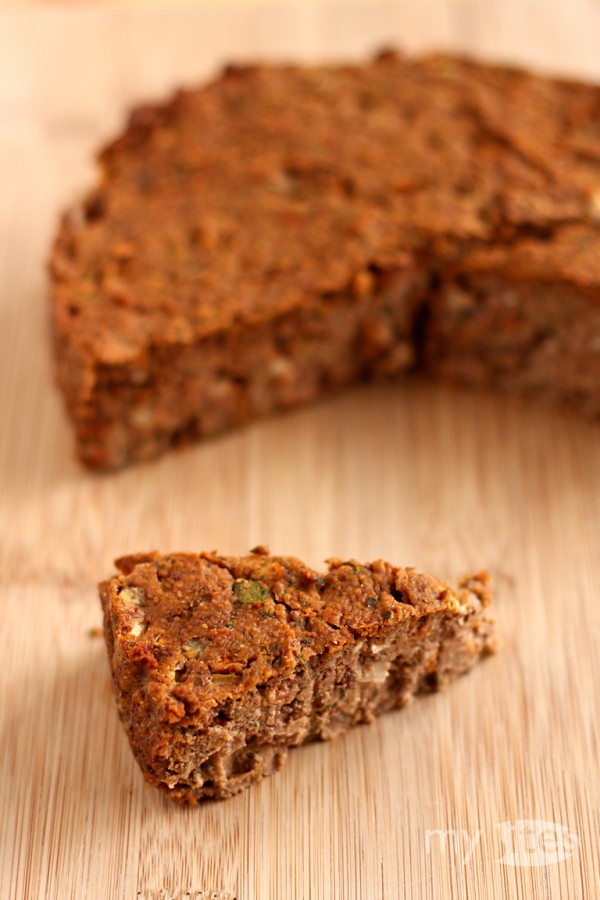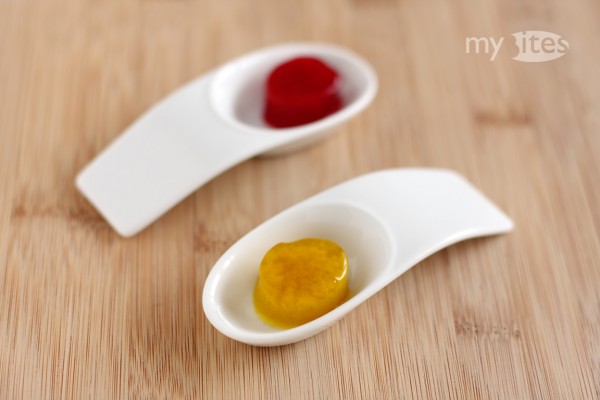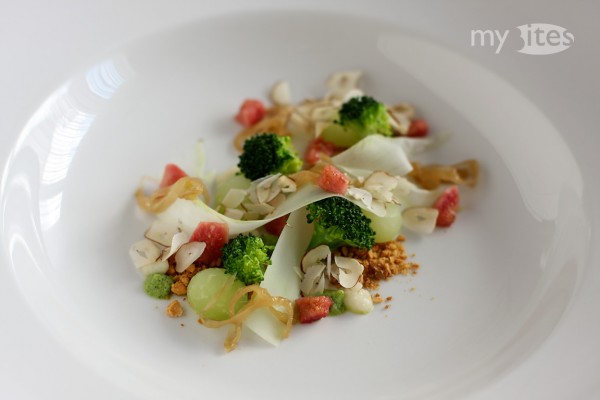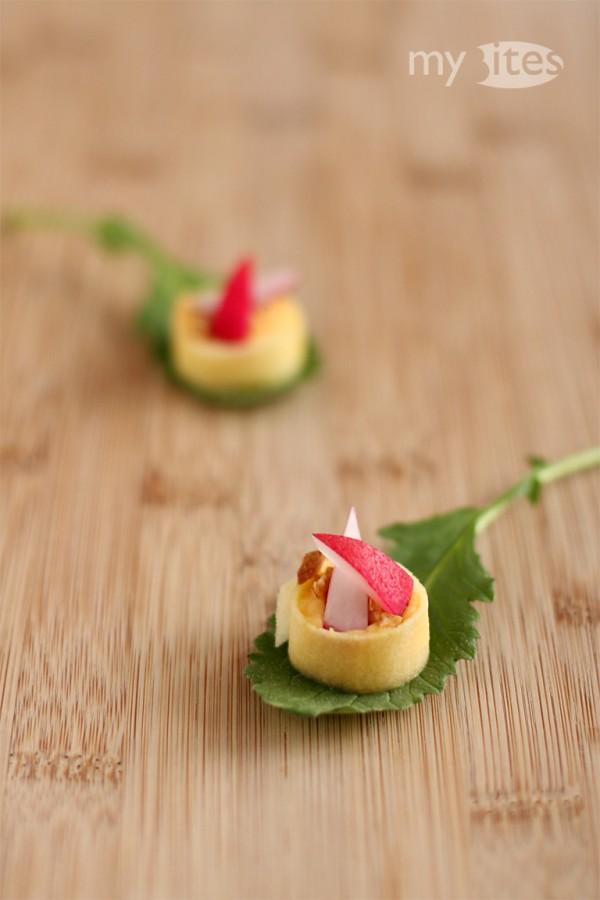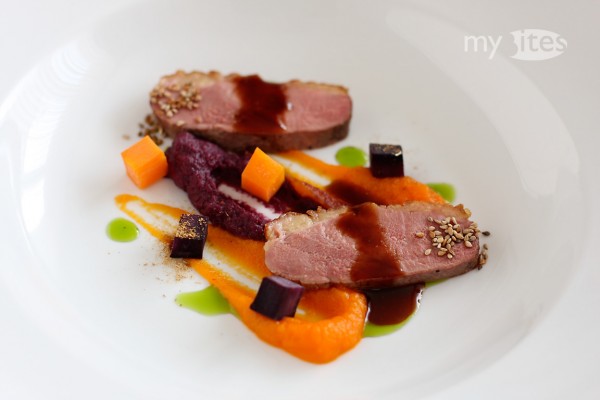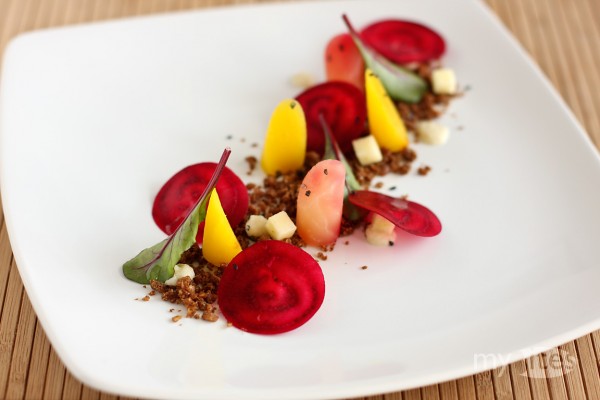Last year in December a friend of mine, Anna called for a “vegastromania month“, where she invited everyone to cook at least one vegetarian or even vegan meal during the Christmas preparations. The main goal of this project was to make people think about vegetarian dishes and what they are eating everyday – which is usually far too much meat. The participants were allowed to submit any kind of recipe except for desserts, because they are mostly naturally vegetarian, less healthy and we already have more than enough of sweet recipes. Anna also assembled some famous Hungarian vegetarians, who picked their favorite recipe. The winner was invited to a very special vegetarian dinner at Anna’s home and also recieved a voucher for an ayurvedic massage. Fortunately, I got picked by the jury, so this January I had a wonderful dinner with Anna, Ági and Noémi. One of the dishes Anna served at this dinner was Mrs. Myrtleberry’s nutcake, which was quite an extraordinary and surprising experience. First, it’s absolutely delicious. But its texture was even more interesting, because it tasted just like minced meat – although there was no meat in the cake at all.
Category Archives: Course
Orange and Beetroot Jelly
For several years I planned to cook one of Heston Blumenthal’s “hoax” dishes. As part of his tasting menu he used to serve a very simple dish called “orange and beetroot” with only a yellow and a red jelly arranged on a plate. Then he asked his guests to start with the orange. Of course every guest assumed the yellow jelly to be the one flavored with orange. But when they tasted it, they were surprised by the beetroot flavor. Heston switched the colors of the ingredients: he prepared the red jelly from freshly squeezed blood oranges and the yellow jelly from golden beetroot juice.
Kohlrabi with Broccoli, Peanut and Fig
Although I was inspired by a combination I collected via Foodpairing, most pairings featured in this starter are quite well known. For example broccoli is often served with almond flakes, where the almond can be replaced by other nuts, such as hazelnut or peanut. I always use the broccoli stem as well, which reminds me of kohlrabi – so pairing broccoli and kohlrabi was straight-forward. Figs might sound a little bit strange, but I already made figs and broccoli work together previously. The dish below unites the aforementioned pairings in a vegan appetizer.
Rutabaga with Cashew Nuts, Apple and Radish
Many people know cashews only as a salty snack. Actually, the unsalted and unroasted cashew nuts are very versatile and can be applied in multiple ways in the kitchen. For example cooked cashews are a great garnish and pair especially well with sunchokes. You can blend the cooked cashews into a fine puree as well, which can be served either pure or flavored with vegetable juices. Compared to other nuts, raw cashews have a slightly softer texture. Roasting them not only crisps them, but also enhances their flavor. Many recipes advise to roast nuts in skillets or dry pans. I always roast nuts in the oven, because this way they don’t get burnt spots, but roast through completely. Roasted cashews can be used as a puree, in desserts or in appetizers, like the starter below.
Duck Breast with Purple and Orange Carrot Puree
Winter is passing by slowly and spring gets in its place. This is a very interesting time of the year, not only because of the awakening of the nature, but also from a culinary point of view. At this time of year, both winter-stored and fresh spring versions of the same ingredients can be found at local markets. While the winter vegetables usually require a lot more cooking time, spring vegetables tend to get soft within minutes. In this dish I combined the last purple carrots from winter with the first orange ones of spring.
Colorful Beetroot Salad on Pumpernickel Crumbs
It was a long and winding road until the golden beetroot finally made it to my kitchen. I first encountered yellow beets on a photo in the German food magazine Der Feinschmecker. Later on, in 2009 I got my hands on a copy of Heston Blumenthal’s Fat Duck Cookbook. It included a very simple yet funny recipe featuring orange and beetroot jelly only (see a photo here). The joke in this dish was that the flavors are swapped: the red jelly is made of blood orange juice and the yellow one using golden beets. I appreciate culinary surprises like this, because the twist and the surprise naturally forces the diner to focus more on the flavor. Among other things, this was also a reason why I began to look for golden beets. Unfortunately, the search took me 3 years, but I finally received 3 exemplars.
